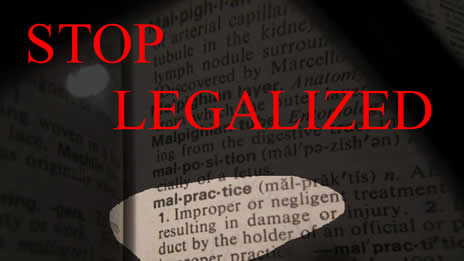
Stop Legalized Malpractice
On January 13, 2011, California legalized attorney malpractice. This was not an act of the California Legislature, but instead resulted from the California Supreme Court decision in Cassel v. Superior Court, which concluded that California’s mediation confidentiality statutes, enacted by the Legislature in 1997 legalizes attorney malpractice. This ruling has altered the traditional fiduciary role attorneys have with their clients, allows California attorneys to betray their clients, act in their own interests or those of others without oversight or accountability and with impunity all at client expense. Parties to disputes in California who choose to mediate their disputes are given no notice of this significant change in the law.
Professor Richard Zitrin of UC Hastings has written,
“the Cassel case leads to an absurd result — one that allows lawyers to be sloppy, negligent and incompetent without cost to them, and even worse, to cheat their clients with impunity.”
These are examples of what attorneys have allegedly done to clients and gotten away with it,
- fabricated a settlement agreement without their clients knowledge. ( Hadley v. Cochran )
- made their client personally liable for a $2.4 million debt owed by another party. The client was forced into bankruptcy as a consequence. ( Amis v. Greenberg Traurig )
- threatened to abandon their client just before trial to force the client to give in to their demands. ( Cassel v. Superior Court )
The appellate court in Wimsatt v. Superior Court wrote,
“We believe that the purpose of mediation is not enhanced by such a result because wrongs will go unpunished and the administration of justice is not served.”
“The situations include cases where a party was lied to by her own attorney, the mediator, and a third party; a scrivener’s error in a mediated settlement lead to a $600,000 windfall to one party; parties claimed their own attorney coerced them into signing a settlement agreement; a mother waived parental rights; and the parties agreed to perform an illegal act in the mediated agreement.”
Justice Chin wrote in his concurring opinion in Cassel v. Superior Court,
“Attorneys participating in mediation will not be held accountable for any incompetent or fraudulent actions during that mediation unless the actions are so extreme as to engender a criminal prosecution against the attorney.”
“I doubt greatly that one of the Legislature’s purposes in mandating confidentiality was to permit attorneys to commit malpractice without accountability.”
Yet when the California Legislature proposed reforming the statutes with Assembly Bill 2025, introduced February 23, 2012, it was immediately challenged and blocked by numerous organizations representing the interests of attorneys intent on keeping the lack of accountability and oversight for what amounts to legalized malpractice. No other state allows attorneys to commit such acts against their clients.
The Legislature has asked the California Law Revision Commission to study these statutes and recommend changes, if any. The CLRC welcomes public input but there is a problem. Many attorneys know about this study and have come out in force to recommend no change. Only five clients and one potential client have responded to the CLRC’s request for public input. All six oppose legalized malpractice.
Please sign this petition if you oppose legalized malpractice.
The following is a note from the California Law Revision Commission should you wish to write them and are involved in a mediation that went wrong.
“Although the Commission is interested in input from any knowledgeable source, it cautions such persons to be mindful of existing constraints on disclosure of mediation communications and materials. That is particularly important with respect to a mediated dispute that remains pending. In sharing information and views with the Commission, it is not necessary, and may be improper, to describe what happened at a particular mediation. Instead, comments that describe a situation in hypothetical terms, without revealing details that may disclose the identities of actual mediation participants, are preferable.”
This is a link to the to the California Law Revision Commission web site where the study of these statutes is being conducted.
SIGN MORE PETITIONS




